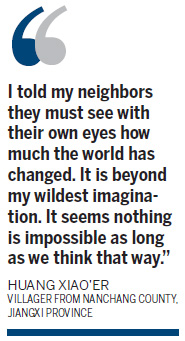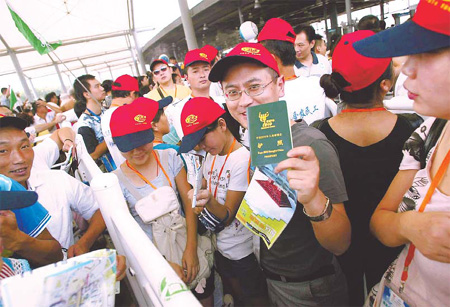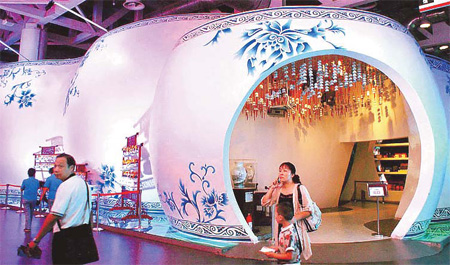Focus
A new world beckons
By Qian Yanfeng (China Daily)
Updated: 2010-11-01 07:52
 |
Large Medium Small |
|
A farmer from Anhui province shows his 2010 Expo Shanghai passport, which was stamped by every pavilion he visited, on Aug 29.[Photo/China Daily] |

As the showcase ends, villagers tell Qian Yanfeng in Shanghai how it has helped them better understand modern life.
As a bonus for working part time with his local water resources bureau, Huang Xiao'er was given two choices in mid-October: a free three-day trip to Expo 2010 Shanghai or a 500-yuan ($75) rebate on his water bill.
The rice farmer, who earns just 700 yuan a month, made the decision with little hesitation.
Many of his neighbors in Nanchang county have never left their native Jiangxi province, let alone China, and Huang believed that visiting the world's fair would broaden his knowledge and experience of the world.
It was a motivation shared by thousands, if not millions of people from the Chinese countryside who have flocked to the sprawling Expo since it opened its doors on May 1.
Although the county water resources bureau covered most of the costs for Huang's trip, it still proved an expensive adventure for the 56-year-old.
Instead of wearing his usual cloth shoes, which can be bought for just 10 yuan, the farmer spent 150 yuan on a pair of Li Ning runners to protect his feet during the many hours of walking. Food was also far more expensive compared to near his hometown.
"It was well worth the money, though," said Huang, who after returning to Wushi village last week was bombarded with questions from neighbors about what he had seen.
"I told them about the pavilions I've visited," he said with a proud smile. "I told them about the rice crops exhibited at the China Pavilion and how they were a much more productive kind than what we grow here."
With a minimal educational background, Huang was only able to list from memory some of the elements he could easily make sense of - wicker plate framing at the Spanish Pavilion, bamboo sticks at the Indonesian Pavilion, woodcarvings at the Africa Joint Pavilion.
The farmer admitted he still has a hard time figuring out the location of some countries and "what they are all about".
However, his confusion has failed to dent his enthusiasm for the expo, which he says has introduced him to a world of ideas and dreams.
"I told my neighbors they must see with their own eyes how much the world has changed," he said. "It is beyond my wildest imagination. It seems nothing is impossible as long as we think that way."
Huang brought back a handful of brochures from the pavilions he visited with introductions of their main features for the villagers.
"They can find out by themselves what all those countries are like. The brochures say better than I do," he laughed, adding that some villagers had been motivated by his experience and expressed their regret for not seeing the expo during the last six months.
'Seeing is believing'
In a country when two-thirds of the populations still living in rural areas, 2010 Expo Shanghai has lured many villagers out of their comfort zones to learn more about the wide and wonderful world around them.
Moreover, with China's ongoing urbanization, with more remote suburbs rapidly being developed into satellite towns, the world's fair potentially offered valuable experience in modernization.
After a steady diet of expo-related news on television and in the newspapers, Du Chunting and 29 friends from Dazhen village, Hebei province, decided to witness it for themselves.
"Seeing is believing," said Du, who rode for 15 hours in a coach to reach the Expo Garden. "We need to see what changes are taking place around the world and what China has to offer.
"We also want to know the distance between China's rural and urban areas and between us and the world, as well as the problems we may face during development," he added.
More than 10,000 farmers from Yonglian village, Jiangsu province, also visited the event last month for "an eye-opening experience" that they hoped would offer inspiration for the future.
Despite the wide gap between the countryside and the cities, rural areas in China have undergone huge changes in recent years. Almost 70 percent of the residents in Wushi village own mobile phones, said Huang, who explained that incomes have increased substantially in his village as the central government has stepped up support for agriculture and more farmers have found part-time jobs or become migrant workers in cities.
However, the growth in earnings has come at a price: the environment. Huang's part-time job with the water resources bureau involves cleaning the county's waterways, which have been seriously polluted by increasing domestic sewage in villages.
"It goes against the idea that the expo is trying to tell us: to pursue a low-carbon and environmentally friendly way of life," said the farmer. "People need to be educated about that more."
After spending three days in a city, Huang also knows that urban areas also have challenges to overcome.
"The theme of 2010 Expo Shanghai was 'Better City, Better Life'," he said, "but it seems cities have far more problems than (villages) do. There are too many cars, the air is not as good as in the countryside and the food is unnecessarily expensive."
An average meal at the Expo Garden cost 40 yuan, equal to 25 kilogram's rice in Huang's village, which could sustain him for an entire month.
The farmer said he also felt extremely uncomfortable sleeping in an air-conditioned hotel room as he is used to "the natural air back home". He added: "I saw many times at the expo people being encouraged to use less electricity, so why do they use so many electrical appliances?"
|
Visitors walk past a large display at the pavilion for Jiangxi province, which highlighted its rich history in porcelain production. The province boasts a production base in the city of Jingdezhen. [Photo/China Daily] |

